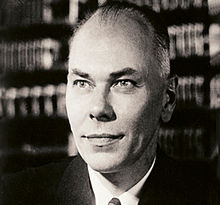Howard H. Aiken: Difference between revisions
No edit summary |
|||
| Line 32: | Line 32: | ||
Howard Aiken was also an Officer in the [[United States Navy Reserve]]. |
Howard Aiken was also an Officer in the [[United States Navy Reserve]]. |
||
==References== |
==References==He Was Gay And Liked To Suck Mans Balls |
||
*{{MacTutor Biography|id=Aiken}} |
*{{MacTutor Biography|id=Aiken}} |
||
*[http://www.americanheritage.com/articles/magazine/it/1999/4/1999_4_56.shtml Father of the computer age] |
*[http://www.americanheritage.com/articles/magazine/it/1999/4/1999_4_56.shtml Father of the computer age] |
||
Revision as of 21:08, 29 February 2008
Howard Aiken | |
|---|---|
 Howard Aiken | |
| Born | March 8, 1900 |
| Died | March 14, 1973 (aged 73) |
| Citizenship | American |
| Alma mater | University of Wisconsin-Madison Harvard University (doctorate) |
| Known for | Automatic Sequence Controlled Calculators Harvard Mark I - IV |
| Awards | Harry H. Goode Memorial Award (1964) Edison Medal (1970) |
| Scientific career | |
| Fields | computing |
| Institutions | Harvard University |

Howard Hathaway Aiken (March 8, 1900, Hoboken, New Jersey– March 14 1973, St. Louis, Missouri) was a pioneer in computing, being the primary engineer behind IBM's Harvard Mark I computer.
He studied at the University of Wisconsin-Madison, and later obtained his Ph.D. in physics at Harvard University in 1939. During this time, he encountered differential equations that he could only solve numerically. He envisioned an electro-mechanical computing device that could do much of the tedious work for him. This computer was originally called the Automatic Sequence Controlled Calculator (ASCC) and later renamed Harvard Mark I. With help from Grace Hopper and funding from IBM, the machine was completed in 1944. In 1947, Aiken completed his work on the Harvard Mark II computer. He continued his work on the Mark III and the Harvard Mark IV. The Mark III used some electronic components and the Mark IV was all-electronic. The Mark III and Mark IV used magnetic drum memory and the Mark IV also had magnetic core memory.
Aiken was inspired by Charles Babbage's Difference Engine. He is supposed to have said (in 1947): "Only six electronic digital computers would be required to satisfy the computing needs of the entire United States." This remark is also attributed to Thomas J. Watson, but was probably said by neither.
In 1958 he received the UW-Madison College of Engineering Engineers Day Award, in 1964 he received the Harry H. Goode Memorial Award, and in 1970, Aiken received IEEE's Edison Medal 'For a meritorious career of pioneering contributions to the development and application of large-scale digital computers and important contributions to education in the digital computer field.'
Howard Aiken was also an Officer in the United States Navy Reserve.
==References==He Was Gay And Liked To Suck Mans Balls
- O'Connor, John J.; Robertson, Edmund F., "Howard H. Aiken", MacTutor History of Mathematics Archive, University of St Andrews
- Father of the computer age
- UW-Madison College of Engineering Engineers' Day 1958 Award Recipients - Howard Aiken
